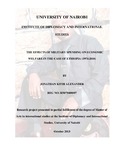| dc.description.abstract | One of the most captivating problems faced by global relation scholars in the present day is the impact of defense spending in the furtherance of a country’s financially viable welfare. As a matter of fact, it is an area under discussion with such wide corollary that no claim to a complete treatment can be straightforwardly made. On the other hand, this study attempts to hold a consistent view of the subject when taking up Ethiopia as a case study. The project begins by laying the foundation of the study through setting the objectives that guided the study. The study’s general objective is to find out the impact of military spending on the economic welfare with Ethiopia as a reference point. The study relies primary data and also on existing literature and policy papers to discuss the issues under the area of the study. The study also discusses and applies the Neo-classical theory to explain the effects of military spending on economic welfare in Ethiopia.
The study then presents the political dynamics of Ethiopia. At one point the country was governed by a dictatorial and Marxist-Leninist leaning regime the policy-making responsibility of which was practically concentrated in the hands of one individual, namely Mengistu Haile Mariam. Beleaguered by political frictions and civil wars, the country struggled with copious military and political threats, which were basically embedded in the Horn of Africa region. Beside the backdrop of these threats, the post-1974 regime engaged in and maintained a high level of military spending, watchfulness and aptitude. The study underline that the net consequence was the creation of possibly the largest and best equipped Armed Forces in Sub-Saharan Africa. The study also stresses that the regime guided the Armed Forces by a dogma largely based on the Soviet model, centralized the High Command, conducted constant training and scrutiny, and put its devotion in the amassing of weaponry that was mainly provided by the
Soviet Union. The study finally discusses the effects of military spending on economic welfare by dwelling on the effects on dependency, national debt and social security. Policy recommendations are then elucidated at the end of the study.
Military or welfare?
This is a question which gave Mengistu’s regime a dilemma. During the derg regime, government expenditure on welfare was competing with the military in terms of importance since there was a lot of internal security amongst the Ethiopians. It was during this time that Mengistu acquired a nick name as the “Red Negus” (The red Emperor) this was because he began to rule the country with an iron fist as he oversaw the read terror. The study sited Mengistu’s regime as it is widely believed that it’s the better part of his reign that witnessed a poor provisions of social services due to the constant conflicts, Drought and famines, and the
revolutionizing of Ethiopia to be a socialist state, a path that was too rugged and expensive to be travelled by an African poor state like Ethiopia. | en |

